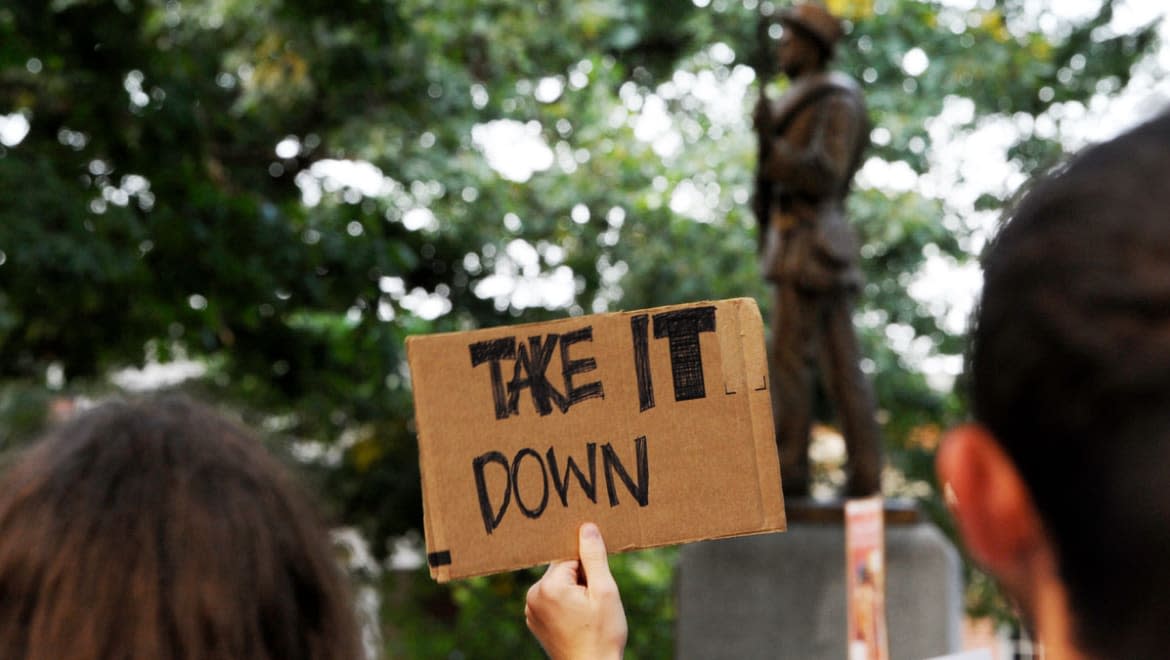Here’s Why Southern Progressives Don’t Just Move Somewhere Else

- Oops!Something went wrong.Please try again later.
Georgia legislators didn’t just summon Jim Crow from its shallow grave with a recent spate of vote-suppressing measures, they seeded dangerous ideas. So predictably, Florida and Alabama began incantations to bring their own black-feathered zombies to life. Oblivious to the April 9 anniversary of the Confederacy’s surrender—or maybe to defy it—Arkansas, Mississippi, South Carolina, and Texas are poised to take a crack at disenfranchisement, too.
Southern progressives are humiliated, but we aren’t surprised. We bear the chagrin from Southern culture’s roots in white supremacy and feudalism. We shake our heads at shameful Lost Cause rhapsodies, a traitorous Old South too often romanticized for tourism’s allure.
We foretold that Shelby v. Holder—the 2013 Supreme Court decision that gutted the Voting Rights Act—would result in these unfolding changes. The only surprise was it took close to a decade to happen.
We’re sadly aware yoga remains outlawed in Alabama public schools because of its cited “religious ties” with Hinduism. We’re leery when an ostentatious Christianity gets poured over everything like ketchup.
We’re mortified as legislators rush to marginalize transgender youth, despite warnings from health-care professionals as to possible harm.
We’re the ones most fearful of environmental danger from toxic industries lured here by public money giveaways from state and local governments. We’re wary of Alabama’s massive coal ash dumps, reservoirs of deadly radioactive waste threatening to poison swaths of wilderness and residential areas, or contaminated water seeping from reservoirs into central Florida and headed for Tampa Bay.
We were sheepish when our neighbors chanted “Drill, Baby, Drill” but more embarrassed after 2010’s Deepwater Horizon oil spill befouled the Gulf Coast—yet didn’t change their oblivious attitudes.
Even Robert E. Lee Wanted the Confederate Flag Gone
The willful ignorance, the racism, the ecological disregard, it’s all maddening for us. Answers are difficult, especially when we’re caught in cultural crossfire. Yet despite feeling imperiled and besieged, we remain here. Some of us are shackled by family obligations, slim opportunities, economic limitations, or medical factors. Others remain for the balmy climate, slower pace, low cost of living, or comfortable familiarity.
So where’s the hope? How does the nation work with the intractable toward a “more perfect union”? Inspiration might be found in the best of us, in Southerners who dispense empathy and kindness in various hues and sizes.
Some are highly visible, like Georgia political dynamo Stacey Abrams. Her fight for wider empowerment drove an electoral success that frightened her state’s old guard into enacting the controversial new voting measures.
Or Bryan Stevenson, the Montgomery, Alabama, lawyer whose Equal Justice Initiative has advocated for those wrongfully funneled into America’s prison industrial complex. His life’s work has dragged into light the inhumanity of modern de facto slavery.
Far more folks are quieter, yet still effective. Like Chris and Karen Bullock, a married duo of Presbyterian pastors in Mobile, Alabama, who transformed their church into a community-oriented, multi-purpose facility. They provide artists with studios, meeting and event space for nonprofits, spark public discussion on social inequities and manage one of the area’s largest food banks.
Or my own father, who has spent the last few decades advocating for Alabama’s underserved schools, in conditions U.N. personnel have likened to Third World locales. He’s raised tens of thousands of dollars for school construction improvements, secured grants, sparked university programs for securing and training rural teachers and traveled the nation seeking assistance for those unable to do so themselves.
These active progressives remain because they’re most needed here. They relish challenges.
Southern progressives also warn how criticized Southerners will double down on stubbornness. The recalcitrance plays into paranoia about “outside agitators” set to “destroy their way of life.” Georgia politicians have shown it, rallying around the corporate and sports rejections.
Same as it did in the 20th century—before FDR’s New Deal brought better jobs and modern amenities; before the Civil Rights Act or the Voting Rights Act halted de jure discrimination—the South needs something beyond mere vilification. Concern beyond condescension and a generous spirit can be coercive. That’s what loosens fear-based politics’ grip on the incurious and insular.
Sure, the South feels like the concrete shoes on the nation’s feet; we get it. The Sisyphean tilt of Southern politics and culture are movement conservatism on methamphetamine. However, if we want to change the South and liberate the nation, we need to apply a chisel to those concrete shoes, not a bone saw to the shins.
Build bridges. Find ways to help. There are plenty of people down here worth saving.
Get our top stories in your inbox every day. Sign up now!
Daily Beast Membership: Beast Inside goes deeper on the stories that matter to you. Learn more.

